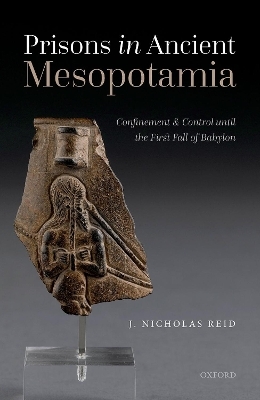
Prisons in Ancient Mesopotamia
Confinement and Control until the First Fall of Babylon
Seiten
2022
Oxford University Press (Verlag)
978-0-19-284961-8 (ISBN)
Oxford University Press (Verlag)
978-0-19-284961-8 (ISBN)
Prisons in Ancient Mesopotamia explores the earliest historical evidence related to imprisonment in the history of the world, considering the multifunctional practices of detaining the body in ancient Iraq.
Prisons in Ancient Mesopotamia explores the earliest historical evidence related to imprisonment in the history of the world. While many historical investigations into prisons have revolved around the important question of punishment, this work moves beyond that more narrow approach to consider the multifunctional practices of detaining the body in ancient Iraq. It is the contention of this book that imprisonment arose out of the desire to control and detain the body in relation to labor. The practice of detainment for coercion became adaptable to a variety of circumstances and goals, which shaped the contexts and practices of imprisonment. With time, religious ideology was attached to imprisonment. In one literary text, a prisoner was refined like silver and given new birth in the prison. The misery of imprisonment gave rise to lament through which a criminal could be ritually purified and restored to a right relationship with their personal god. Beyond this literary perspective, this work reconstructs how imprisonment and religious ideology intersected with the judicial process and explores the evidence related to the reasons behind imprisonment, the treatment of prisoners, and the evidence related to the lengths of their stays.
Prisons in Ancient Mesopotamia explores the earliest historical evidence related to imprisonment in the history of the world. While many historical investigations into prisons have revolved around the important question of punishment, this work moves beyond that more narrow approach to consider the multifunctional practices of detaining the body in ancient Iraq. It is the contention of this book that imprisonment arose out of the desire to control and detain the body in relation to labor. The practice of detainment for coercion became adaptable to a variety of circumstances and goals, which shaped the contexts and practices of imprisonment. With time, religious ideology was attached to imprisonment. In one literary text, a prisoner was refined like silver and given new birth in the prison. The misery of imprisonment gave rise to lament through which a criminal could be ritually purified and restored to a right relationship with their personal god. Beyond this literary perspective, this work reconstructs how imprisonment and religious ideology intersected with the judicial process and explores the evidence related to the reasons behind imprisonment, the treatment of prisoners, and the evidence related to the lengths of their stays.
J. Nicholas Reid is Associate Professor of Old Testament and Ancient Near Eastern Studies and Director of the Hybrid MDiv Program at Reformed Theological Seminary, Orlando. He has co-authored a forthcoming volume for Oxford University press, Letters from Old Babylonian Kish (2022), and has published several academic articles.
Introduction
1: Imprisonment from the Dawn of History to the First Fall of Babylon
2: Confine and Control: Lexical and Social-Historical Summary
3: How to End up Imprisoned
4: Judicial Process and Proof
5: The Imprisoned Life
6: The King in the Cage: Ritual Purification and Imprisonment
Conclusion
| Erscheinungsdatum | 05.09.2022 |
|---|---|
| Verlagsort | Oxford |
| Sprache | englisch |
| Maße | 142 x 221 mm |
| Gewicht | 382 g |
| Themenwelt | Geschichte ► Allgemeine Geschichte ► Vor- und Frühgeschichte |
| Geschichte ► Allgemeine Geschichte ► Altertum / Antike | |
| Geschichte ► Teilgebiete der Geschichte ► Kulturgeschichte | |
| Recht / Steuern ► Strafrecht ► Kriminologie | |
| ISBN-10 | 0-19-284961-1 / 0192849611 |
| ISBN-13 | 978-0-19-284961-8 / 9780192849618 |
| Zustand | Neuware |
| Informationen gemäß Produktsicherheitsverordnung (GPSR) | |
| Haben Sie eine Frage zum Produkt? |
Mehr entdecken
aus dem Bereich
aus dem Bereich
Konzepte – Methoden – Theorien
Buch | Softcover (2024)
UTB (Verlag)
39,90 €
meine Suche nach den Urzeit-Genen
Buch | Hardcover (2024)
DVA (Verlag)
26,00 €


